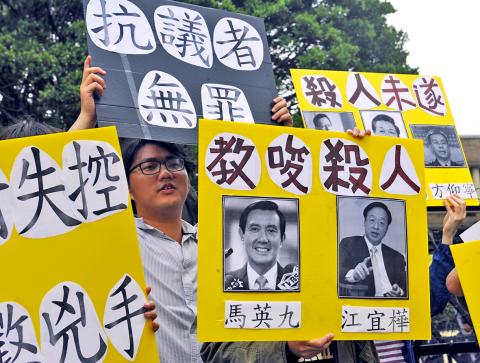The Supreme Court rejected an appeal filed by former premier Jiang Yi-huah (江宜樺), upholding a decision made by the Taiwan High Court in February asking the Taipei District Court to reconsider an attempted murder charge against Jiang over the government’s forced eviction of Sunflower movement activists from the Executive Yuan compound in Taipei last year.
Chou Jung-tsung (周榮宗), a 76-year-old activist who died last month, filed the charge against a number of officials, including Jiang, President Ma Ying-jeou (馬英九), then-National Police Agency director-general Wang Cho-chiun (王卓鈞) and other high-ranking law enforcement officials.
Chou said earlier last year that he sustained fractured ribs and other injuries when he was assaulted by police officers with a shield and later blasted by water cannons.

Photo: George Tsorng, Taipei Times
The protests at the Executive Yuan were part of the Sunflower movement, in which protesters occupied the Legislative Yuan’s main chamber in protest against the government’s handling of the cross-strait service trade agreement.
On the night of March 23 last year, student-led protesters forced their way past barricades to stage a sit-in at the Executive Yuan. Jiang authorized a crackdown in the early morning of March 24, resulting in scores of protesters reporting injuries they said were caused by officers using batons, shields and water cannons.
Chou filed the attempted murder charge with the Taipei District Court, which issued a provisional disposition ordering the police to keep for litigation video recordings, duty rosters and other documents related to the Executive Yuan eviction.
After reviewing Chou’s written statements, the district court rejected the charge in January, referring to improper procedural handling on the part of the plaintiff and ruling that Jiang and Wang did not overstep their authority by ordering the eviction of protesters, adding that Chou did not enlist any witnesses or present incriminating evidence.
However, the High Court ruled that the district court’s decision was at odds with the Code of Criminal Procedure (刑事訴訟法) by focusing on the procedural aspects of the case without conducting substantial investigations into each of Chou’s allegations. The High Court thereby remitted the case back to the district court.
Jiang appealed the High Court’s ruling to the Supreme Court, which upheld the High Court’s decision and remanded the case to the Taipei District Court.
Chou’s was the first of about 50 lawsuits filed by protesters.
Chou’s daughter took over his lawsuit after his death, she said.

MAKING WAVES: China’s maritime militia could become a nontraditional threat in war, clogging up shipping lanes to prevent US or Japanese intervention, a report said About 1,900 Chinese ships flying flags of convenience and fishing vessels that participated in China’s military exercises around Taiwan last month and in January last year have been listed for monitoring, Coast Guard Administration (CGA) Deputy Director-General Hsieh Ching-chin (謝慶欽) said yesterday. Following amendments to the Commercial Port Act (商港法) and the Law of Ships (船舶法) last month, the CGA can designate possible berthing areas or deny ports of call for vessels suspected of loitering around areas where undersea cables can be accessed, Oceans Affairs Council Minister Kuan Bi-ling (管碧玲) said. The list of suspected ships, originally 300, had risen to about

DAREDEVIL: Honnold said it had always been a dream of his to climb Taipei 101, while a Netflix producer said the skyscraper was ‘a real icon of this country’ US climber Alex Honnold yesterday took on Taiwan’s tallest building, becoming the first person to scale Taipei 101 without a rope, harness or safety net. Hundreds of spectators gathered at the base of the 101-story skyscraper to watch Honnold, 40, embark on his daredevil feat, which was also broadcast live on Netflix. Dressed in a red T-shirt and yellow custom-made climbing shoes, Honnold swiftly moved up the southeast face of the glass and steel building. At one point, he stepped onto a platform midway up to wave down at fans and onlookers who were taking photos. People watching from inside

Japan’s strategic alliance with the US would collapse if Tokyo were to turn away from a conflict in Taiwan, Japanese Prime Minister Sanae Takaichi said yesterday, but distanced herself from previous comments that suggested a possible military response in such an event. Takaichi expressed her latest views on a nationally broadcast TV program late on Monday, where an opposition party leader criticized her for igniting tensions with China with the earlier remarks. Ties between Japan and China have sunk to the worst level in years after Takaichi said in November that a hypothetical Chinese attack on Taiwan could bring about a Japanese

The WHO ignored early COVID-19 warnings from Taiwan, US Deputy Secretary of Health and Human Services Jim O’Neill said on Friday, as part of justification for Washington withdrawing from the global health body. US Secretary of State Marco Rubio on Thursday said that the US was pulling out of the UN agency, as it failed to fulfill its responsibilities during the COVID-19 pandemic. The WHO “ignored early COVID warnings from Taiwan in 2019 by pretending Taiwan did not exist, O’Neill wrote on X on Friday, Taiwan time. “It ignored rigorous science and promoted lockdowns.” The US will “continue international coordination on infectious